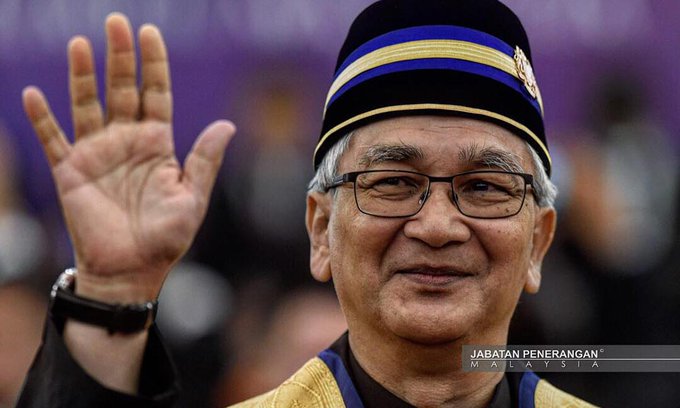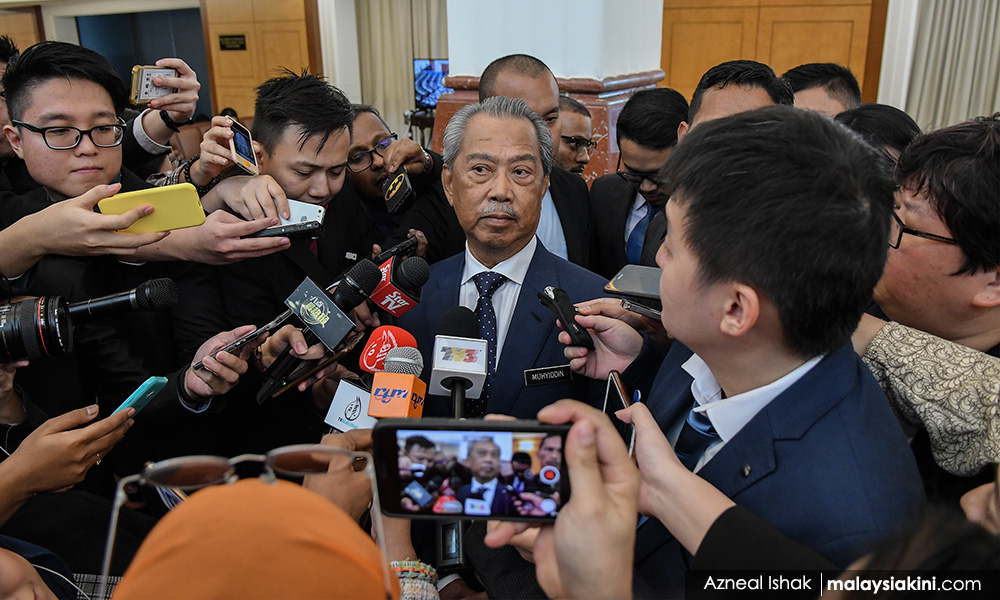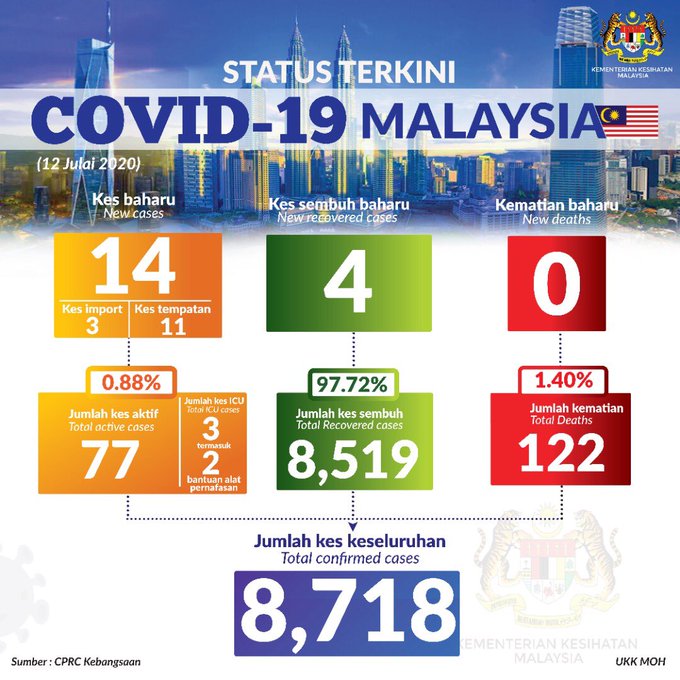Peliknya Anwar ni. Bila Mahathir kata nak jadi PM, Anwar tak setuju, tapi Anwar tak kata tak mahu bekerjasama dgn Mahathir. Bila PH sebut nama Anwar sebagai calon PM, Mahathir tak setuju lantas berkata tiada lagi kerjasama dgn Anwar. Bila PH Plus dulu sebut nama Shafie sbg calon PM, Keadilan tidak setuju tapi Anwar tidak kata Warisan tidak lagi boleh bekerjasama dengan PH. Apa tindakan Mahathir? Bila dia cuba untuk jerat Anwar agar putuskan hubungan dgn kumpulan dia dan Warisan gagal, maka Mahathir sendiri umum Blok Bebas. Itu stail Mahathir yg terkenal sejak dulu dan tidak lagi boleh berubah, iaitu "pecah dan perintah". - Wfauzdin Ns


Ambooi...jumpa cara senyap2...
Kalu dah hangpa(hgpa) tak suka PKR hgpa benci sgt dgn bang Non mudah jer. Kalau dah hgpa boleh dok berpakat sakan dgn Atuk dan Piee Warisan, apa salahnya join shj sbg. WarisBebas...tinggalkan PKR dan bang Non biaq PH terbubar. Baru hgpa puashati bukan?
Takkanlah kot hgpa dok benci kutuk2 bang Non dan PKR tetiba hgpa nak kerjasama lagi dgn dia? Pelik bin pelik bin ajaib..
Heran jugak, hari2 dok mengata kat abang Non,sebenaqnya hgpa nak apa? Kalu dah tak cukup numbers tak boleh jadi gomenlah. Kalu tipis pun tak guna. Kalu hgpa berasa Atuk dan Piee Bedal ada numbers, jalan dululah tanpa PKR. Apa susahnya?
Kami sanggup tunggu sampai PRU15. Apa ada hai? Kalu hgpa tak sanggup jadi pembangkang nak juga jadi gomen, mudah jer. Pi join PN, dapatlah jawatan,sekurang2 dlm GLC. Dah kelapaq sgt nak jadi gomen,semua cara boleh bukan? - Zus Din

Historic Parliament Session
Begins 13th July...
The sitting of the Dewan Rakyat (the House of Representatives) of the Malaysian Parliament starting tomorrow is a momentous occasion – a history in its own right. Two “extraordinary” items fire the imagination of the public. One concerns the position of the Speaker and the other of the Prime Minister himself.
And there might be a third – a new voting bloc. The former Prime Minister (twice), Dr Mahathir Mohamad, had announced that six “Bersatu” MPs are aligning themselves with nine Warisan and a single UPKO members to form a new voting bloc.
As had been widely reported, the Prime Minister, Muhyiddin Mohd Yassin, had submitted a motion seeking the removal of the highly regardless Speaker, Tan Sri Mohamad Ariff Md Yusof, while Dr Mahathir would continue with his motion to have Muhyiddin removed.
Since being sworn in on March 2, Muhyiddin had adopted a slash and burn policy of firing appointees of the Pakatan Harapan (PH) government, most of whom were professionals, and replacing them with his people, the majority of whom are politicians. It’s his way of buying support.
Mohamad Ariff, a former Appeal Court judge was appointed in July 17, 2018 upon the victory of the PH in the May 9 General Elections. Also to be removed is one of the two Deputy Speakers, Nga Kor Ming, the PH (DAP) Member of Parliament for Teluk Intan, Perak. The other, Mohd Rashid Hasnon, the PH (PKR) MP for Batu Pahat, Johor, appears to be unaffected.
It has been widely reported that Muhyiddin has nominated the former Chairman of the Election Commission, lawyer Azhar Harun, as the candidate for the Speaker post and the BN (Umno) MP for Pengerang, Johor, Azalina Othman Said, as Nga’s replacement.
Azhar, who is better known by his non de plume Art Harun, resigned from the EC on June 29. He was nominated to the EC post by the PH government of which Muhyiddin was a senior member. It appears that he is being nominated in order to continue to give a semblance of independence to the Chair. But it raises eyebrows because only four months ago Muhyiddin had nominated his elder brother, Idrus Harun, as Attorney General.
Two things are to be considered. Firstly, it has been widely reported that this is the first time in the country’s history that the Prime Minister is seeking the removal of the Speaker. Secondly, the motion could be used to show confidence in the Prime Minister or as an indirect no-confidence vote against him depending on the “yea” and “nay” from members.
Do bear in mind that Muhyiddin himself had admitted, during his March 27 television broadcast, that “this isn’t the government you voted for.” His Muafakat Nasional (MN) ally, Pas President Abdul Hadi Awang was even more candid when he described Muhyiddin’s Perikatan Nasional (PN) government as one that came in through the roof.
Abdul Hadi, who is the MP for Marang, had since been appointed Muhyiddin’s Special Envoy to the Middle East with ministerial status and understandably had stopped complaining about the legitimacy of the PN’s government.

No-Confidence Motion
According to media report, Dr Mahathir had successfully submitted a no-confidence motion against Muhyiddin. It was supposed to have been moved in the last session. But Muhyiddin succeeded in stifling it by limiting the session to one day - May 18 - and confining the nominal sitting to just the King’s speech.
And now it’s being widely speculated that Muhyiddin is seeking Mohd Ariff’s removal because he (Mohd Ariff) accepted Dr Mahathir’s motion. If he remains in the Chair, he might facilitate the tabling of the “usul”.
Muhyiddin could be betting on a more thoughtful and kinder treatment from a new Speaker in whose appointment he has a hand. But it might not be as easy as that. He could face resistance from House members. They might not agree with his attempt to remove Mohd Ariff and appoint Azhar.
If this happens, his standing as the Prime Minister will be hurt because such an outcome could be interpreted as an indirect no-confidence vote against him. Conversely, if he succeeds in having Mohd Ariff removed and Azhar appointed, his position becomes stronger and Dr Mahathir’s no-confidence motion could see a tougher passage.
But whatever the outcome maybe, the final objective must still be for the good of the country and the people more so as we enter the recovery phase of the Covid-19 pandemic and are rebuilding of the economy. - A.Kadir Jasin
What if Muhyiddin fails
to remove Ariff?...
to remove Ariff?...
Prime Minister Muhyiddin Yassin has made a move to remove the parliamentary speaker Mohamad Ariff Md Yusof against the staunch objection by civil society and the opposition.
But what if a miracle happens that the motion - unprecedented for the Parliament - is narrowly defeated? Talk about unintended consequences in politics.
Would that backfire on Muhyiddin that a failed removal of the speaker, in turn, shortens his premiership or at least forces him into a snap poll, much like how Dr Mahathir Mohamad’s machination to derail Anwar Ibrahim’s succession ended in terminating his own?
Legislative defeat does not amount to a loss of confidence. Just like the rejection of Budget (supply bill), a legislative defeat was once treated as an informal vote of no-confidence, necessitating the prime minister to resign or seek fresh election.
In fact, the first prime ministerial resignation in Britain happened in 1742 when Britain’s first PM Robert Walpole lost a House of Common’s vote on the validity of a by-election. A year before that, the first-ever formal motion of no-confidence was tabled against Walpole but he survived.
In 1944, Winston Churchill forced the Parliament to vote on an amendment bill as a vote of confidence on his premiership and won the gamble. As politics get more fragmented and government backbenchers more rebellious, it makes no sense for contemporary governments to resign over every legislative defeat. A case in point: Theresa May resigned only after her fourth humiliating defeat in the House over Brexit, which would affect Britons for generations.
Hence, if Muhyiddin fails to remove the speaker, he needs not to be seen as losing the Parliament’s confidence, although it would look good for him to table and win a vote of confidence to silence his detractors. In fact, as pointed out by PKR parliamentarian Hassan Karim, Muhyiddin even has a convenient precedent left by Mahathir, the first PM who lost on a constitutional amendment. Much ado over nothing in changing speaker?
On the other hand, how much advantage would Muhyiddin gain by successfully removing Ariff (below)? If Muhyiddin’s motivation to remove Ariff is an act of vengeance on the speaker’s decision to accept Mahathir’s motion of no-confidence on the original agenda for the May 18 parliamentary session, then it makes perfect sense.

After all, Ariff is the first federal speaker that defies sitting prime ministers, a bad example that must be removed if you want a rubber stamp Parliament. However, if changing of the speaker is driven by a cool-headed calculation to keep Muhyiddin in office, I am afraid that the PM may have been ill-advised.
The opposition has two ways to unseat a government. A formal motion of no-confidence can be suppressed by pushing it down to the bottom of the agenda with government businesses – Mahathir’s motion of no-confidence is now the 27th item – and a partisan speaker is useful to avoid any fast track of such motions.
However, the second way – the defeat of the Budget – cannot be avoided by even the most partisan speaker in the world. Every year, when the Budget is being tabled, technically the government’s head is on the Parliament’s chopping board.
When the Budget is passed, the Parliament’s axe stays in the air and the government’s head passes through the chopping board in one piece. No speaker can stop the axe from falling down. What keeps the axe in the air is the government’s majority.
So, if Muhyiddin loses his majority, his government will end latest by early December when his budget must be put to vote. If the opposition has a majority, they can slowly humiliate the government by voting down every motion in the seven-week process right after Budget Day (Nov 6).
Strategically speaking, dishing out cabinet and government-linked company (GLC) positions to ensure the loyalty of government MPs is indeed the rational move in that “scheme of things”, not changing the speaker. And if the government does have the majority, defeating the opposition’s motion of no-confidence will procedurally legitimise its power and stealing the latter’s thunder.
Where extending government’s lifeline is concerned, changing the speaker may be a placebo rather than a magic pill. Government’s little gain, democracy’s big loss?

Some readers will now ask, how can it be possible that a little gain for the government turns to be a big loss for democracy that civil society and the opposition make a huge protest? The answer is simply this: Parliament is more than just the electoral college of the prime minister.
Other than retaining/revoking confidence government and approving budgets (supply bills) – the so-called “confidence and supply” matter, we pay Parliament (RM145 million in 2019, of which RM44 million alone for MPs’ monthly allowance) to make laws and scrutinise the government.
Our Dewan Rakyat needs a speaker who is both impartial and visionary to unite the MPs from across the different parties and to continue parliamentary reform: more parliamentary committees, slots for non-government business, balloting for private members’ bills, recognition for shadow cabinet and a parliamentary service commission.
A partisan speaker alone can make the august House a rubber stamp by silencing the opposition and vocal government backbenchers. We have seen enough of Ariff’s predecessors in Dewan Rakyat as well as speakers in state assemblies who block lawmakers from questioning the government even suspend them just to protect the executive from embarrassment. Standing up to the executive is, therefore, the first quality that we must look for in parliamentary speakers.
When Charles I entered the English Parliament in 1642 with soldiers to arrest five MPs, England’s greatest parliamentary speaker William Lenthall famously defied the king by saying: “May it please your majesty, I have neither eyes to see nor tongue to speak in this place but as this house is pleased to direct me whose servant I am here; and humbly beg your majesty’s pardon that I cannot give any other answer than this is to what your majesty is pleased to demand of me.”
Ariff is the closest we have to Lenthall. He defied two prime ministers. Before defying Muhyiddin in May by accepting Mahathir’s motion, he defied Mahathir’s request to convene a special session on March 2. Had he conceded to Mahathir, who made him the speaker, Muhyiddin may not be PM today. Hence, Ariff is not a loyalist to Mahathir or Pakatan Harapan. He is a loyalist to parliamentary democracy.

Not many speakers get to be tested twice to demonstrate the independence of Parliament from PM. In passing both tests, Ariff not only can hold his head high in history, but he also made a new page in history for our Parliament. And what is the reason to remove Ariff now? The motion offers nothing except that “terdapat pencalonan lain” (there is now another candidate).
This is an insult to Ariff, the new nominee Azhar Harun (above) and the office of the speaker. The speaker is not a spectacular chandelier in a white elephant building which costs RM145 million in annual maintenance that you simply replace one with another.
I am an admirer for Azhar’s vision, competence and integrity. He can certainly be a great speaker, possibly no less than Ariff, in any other circumstance, and definitely a great president of the Senate. It is tragic now that Azhar is made to fill in the shoes of a giant who must be sacked for having passed the providence’s test to defy two prime ministers.
Is a surprise defeat possible? If all 222 MPs give full attendance and abide by party lines, it would be a slim majority of 113 to 109. But the final numbers may be different. Any opposition MPs who are absent may raise suspicion that they will soon join the government’s bench.
On the other hand, government MPs who are absent for whatever reason – food poisoning, coughs, fever or some non-medical circumstance – will help to keep a good speaker while reminding the PM of their own values. If they have not got any GLC appointment, they would likely get it before the Parliament is adjourned in August.
If you want to tell the MPs to do the right thing, whether in the presence or by their absence, please sign the petition here. - Wong Chin Huat,mk

Again? this "hate-crime" need to stop!!!


